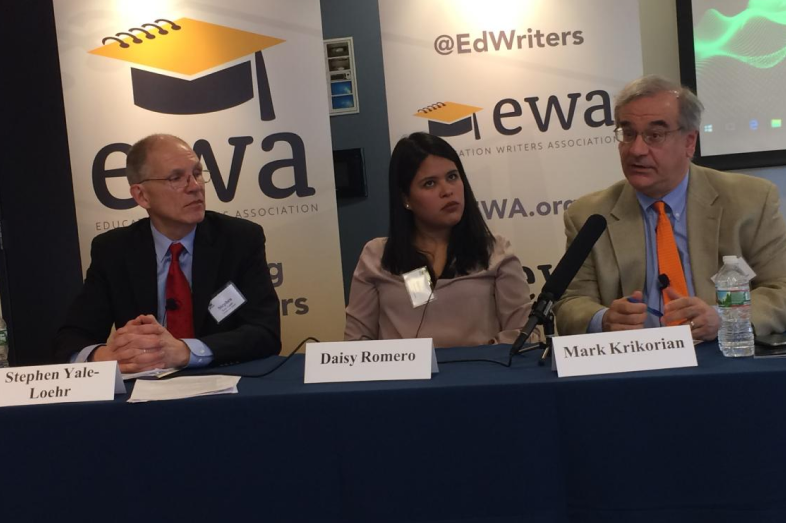

As the movement to protect immigrants, both documented and undocumented, grows in the early days of President Trump’s administration, at least 30 colleges and universities have declared themselves to be sanctuary campuses, one immigration expert said recently.
But what does “sanctuary campus” actually mean? And what can the federal government do to punish schools that refuse to cooperate with immigration enforcement officials?
“People ask me all the time what is a sanctuary campus,” said Stephen Yale-Loehr, an immigration attorney at Cornell University Law School, noting that the term doesn’t carry any legal weight. “Technically, it means a lot of different things to a lot of different people.”
Yale-Loehr spoke earlier this month on a panel about undocumented students at the Education Writers Association conference in Philadelphia hosted by the University of Pennsylvania Graduate School of Education
“Some of sanctuary resolutions try to walk that fine line to say, ‘We will not affirmatively volunteer information to the federal government about our student’s immigration status except to the extent that we are required to under federal law,’” he said. “Some resolutions just state things more generally: We have a non-disclosure policy under FERPA, so we generally won’t disclose about students information unless when required.”
But there could be significant consequences for sanctuary campuses that refuse to allow U.S. Immigration and Customs Enforcement agents at their schools, said Mark Krikorian, executive director of the Center for Immigration Studies, a Washington-based independent research organization.
Immigration enforcement officials who have warrants legally must be allowed onto campuses.
“If you’re sanctuary, the whole point is you’re defying the law,” Krikorian said. Otherwise, “you’re just showing off.”
Krikorian said the federal government could punish them by stripping these institutions of their right to issue I-20 forms, documentation that international students need to obtain their visas to study in the United States.
“You don’t get foreign students, and there’s nothing you can do about it,” Krikorian said. “That‘s the kind of thing that can really, I think, get the attention of university administrators.”
The threat of losing some federal funding also exists, although it would likely be a complex process, Yale-Loehr said.
“Colleges are certainly worried what they can do and what they can’t do, and they’re trying to figure out the proper balancing point,” Yale-Loehr said.
Congress could create laws with certain strings attached so schools that don’t adhere to the regulations lose funding, said Krikorian, adding the president is limited in his authority to do it on his own.
Yale-Loehr gave a list of ideas for schools to help undocumented students.
He suggested schools designate a central point person for all immigration issues. There should be mental health counseling services available as undocumented students face anxiety and deal with the uncertainties as well as legal help for when students are graduating and want to know their options with their legal statuses.
“There are a variety of things campuses can do within existing law that are appropriate and legal and will make documented and undocumented students feel more welcome and more knowledge about their immigration options,” Yale-Loehr said.